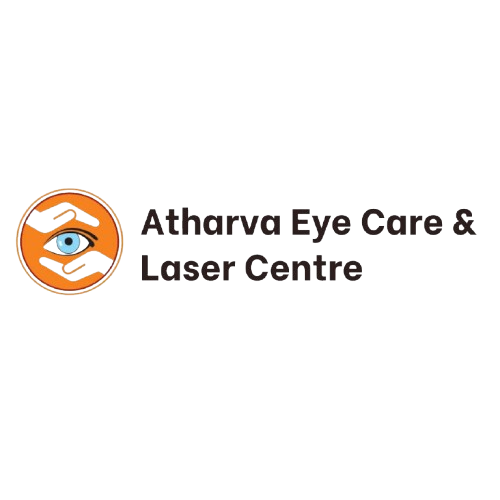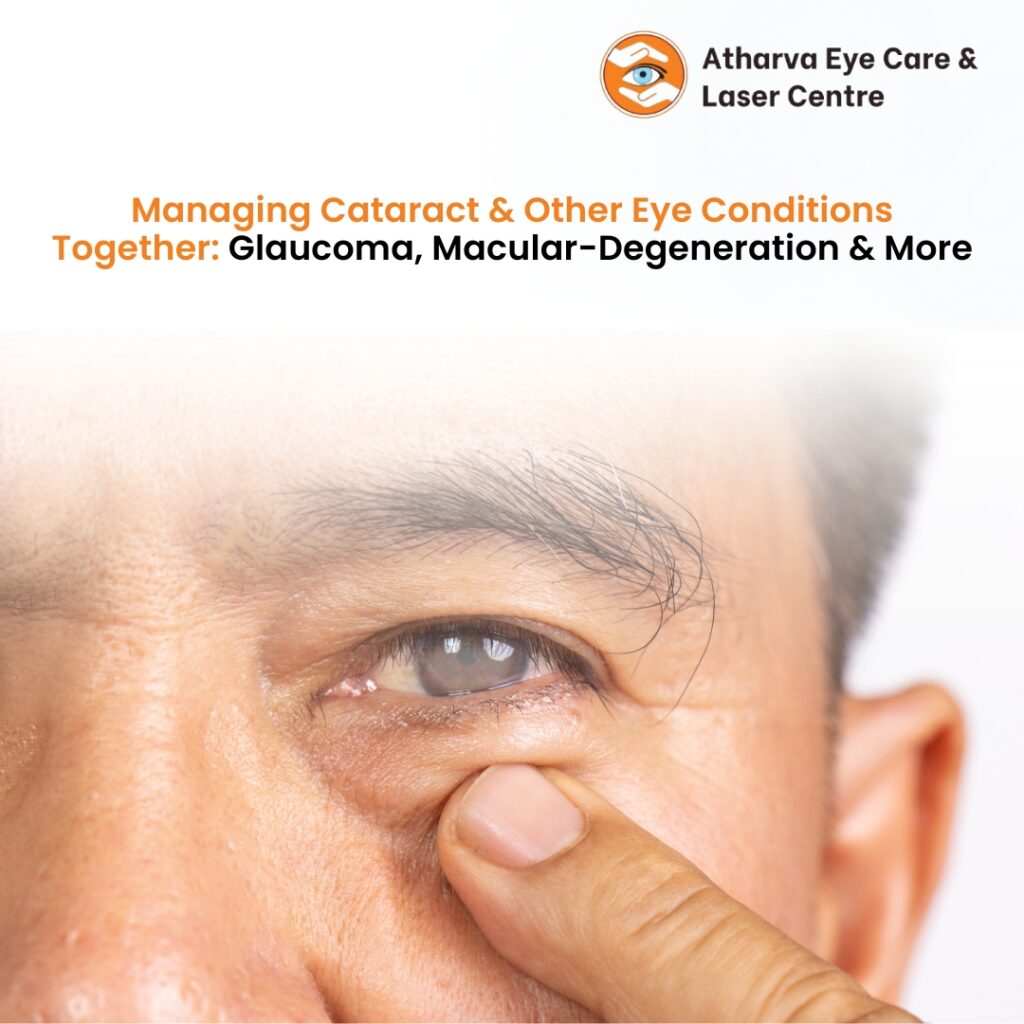- November 11, 2025
- By: atharvaeyeclinic.com
- No Comments
Managing Cataract & Other Eye Conditions Together: Glaucoma, Macular-Degeneration & More
Understanding the Overlap Between Cataract and Other Eye Diseases
As people age, it’s common to face more than one eye problem at the same time. While cataract is one of the most frequently treated eye conditions, it can often coexist with other disorders such as glaucoma, macular degeneration, or diabetic retinopathy. Managing these conditions together requires careful planning and expert guidance to preserve vision and ensure optimal outcomes.
At Atharva Eye Clinic in Kalyan, our team of experienced ophthalmologists provides a comprehensive approach to managing such complex eye cases, using advanced technology and personalized treatment strategies.
What Happens When Cataract Coexists with Other Eye Conditions?
When a cataract develops, it causes clouding of the natural lens, leading to blurred or dim vision. However, if another eye condition is present simultaneously, diagnosing and treating cataract can become more challenging. The key lies in understanding how each condition affects vision and how treatment choices can influence one another.
- Cataract and Glaucoma
Glaucoma is a condition characterized by increased pressure within the eye, which can damage the optic nerve and lead to vision loss. Managing cataract in a patient with glaucoma requires a delicate balance — both conditions can affect vision, but their treatment paths can sometimes overlap.
Key considerations:
- Pre-surgery evaluation: Eye pressure, optic nerve health, and the severity of visual field loss are assessed before cataract surgery.
- Surgical approach: In some cases, combined cataract and glaucoma surgery (phacoemulsification with trabeculectomy or MIGS – Minimally Invasive Glaucoma Surgery) is performed to address both issues simultaneously.
- Post-surgery care: Eye pressure must be closely monitored after surgery, as it can fluctuate during the healing process.
At Atharva Eye Clinic, our specialists customize the surgical plan to protect the optic nerve while improving clarity of vision.
- Cataract and Age-Related Macular Degeneration (AMD)
Macular degeneration affects the central part of the retina responsible for sharp, detailed vision. It is one of the leading causes of vision loss in older adults. When cataract and AMD coexist, patients often experience both blurred central vision and cloudiness caused by lens opacity.
Managing both conditions:
- Diagnostic precision: Advanced retinal imaging (OCT scans) helps in assessing the extent of macular damage before recommending cataract surgery.
- Realistic expectations: Cataract surgery can improve brightness and contrast, but if AMD is advanced, complete visual clarity may not be achievable.
- Ongoing AMD care: Post-surgery, continued treatment such as anti-VEGF injections, nutritional supplements, and low-vision aids may be recommended to preserve central vision.
At Atharva Eye Clinic, Kalyan, we provide integrated management for patients with AMD and cataract, ensuring that both retinal and lens conditions are addressed holistically.
- Cataract and Diabetic Retinopathy
Diabetes can cause damage to the blood vessels in the retina, a condition known as diabetic retinopathy. When cataract develops in diabetic patients, surgery must be planned carefully because diabetes affects healing and increases the risk of complications.
Our approach:
- Preoperative control: Blood sugar levels must be stabilized before surgery.
- Retinal evaluation: The retina is examined to detect any bleeding or swelling (macular edema) before cataract removal.
- Sequential treatment: In some cases, retinal laser or anti-VEGF injections are done prior to cataract surgery to improve postoperative outcomes.
- Close follow-up: Post-surgery, regular monitoring helps detect any recurrence of diabetic eye changes early.
At Atharva Eye Clinic, diabetic patients receive coordinated care from cataract and retina specialists to achieve the best visual recovery.
- Cataract and Dry Eye Disease
Although not as vision-threatening as glaucoma or AMD, dry eye disease can significantly affect cataract surgery results. A dry, unstable tear film can interfere with accurate lens measurements and slow postoperative healing.
Treatment strategy:
- Pre-treating dry eyes with lubricating drops or anti-inflammatory therapy before surgery
- Using tear film analysis to guide intraocular lens (IOL) selection
- Maintaining proper hydration and eye care post-surgery
Our clinic ensures dry eye management is part of every cataract patient’s preoperative assessment.
Comprehensive Eye Evaluation is Key
When managing multiple eye conditions, a detailed diagnostic evaluation is essential. This includes:
- Vision testing and refraction
- Slit-lamp examination
- Retinal OCT and fundus imaging
- Intraocular pressure measurement
- Visual field analysis
These tests help identify how much of the vision problem is due to cataract and how much is caused by other underlying diseases.
Advanced Technology at Atharva Eye Clinic
At Atharva Eye Clinic, Kalyan, we use state-of-the-art diagnostic tools and surgical techniques such as:
- Phacoemulsification with foldable IOL implantation
- Femtosecond laser-assisted cataract surgery (FLACS)
- Advanced retinal imaging (OCT, Fundus Photography)
- Combined cataract and glaucoma procedures
Our focus is always on maximizing patient comfort, safety, and long-term visual results.
Personalized Treatment and Long-Term Follow-Up
Every patient’s eye health is unique. Therefore, managing cataract alongside other conditions requires individualized care plans. Our ophthalmologists take into account:
- The severity of coexisting eye diseases
- Lifestyle and vision goals
- Systemic health conditions like diabetes or hypertension
Regular follow-up visits after surgery are crucial for maintaining eye pressure, retinal health, and overall visual function.
When to Consult a Specialist
If you have been diagnosed with cataract and also have glaucoma, macular degeneration, or diabetes, you should consult an experienced eye specialist before deciding on surgery. Early detection and comprehensive care can prevent irreversible vision loss.
Conclusion
Managing cataract with other eye conditions such as glaucoma, macular degeneration, and diabetic retinopathy requires expertise, precision, and advanced technology. At Atharva Eye Clinic, Kalyan, our specialists provide holistic eye care that addresses every aspect of your visual health.
Schedule your eye check-up today and take a proactive step towards preserving your vision for years to come.

